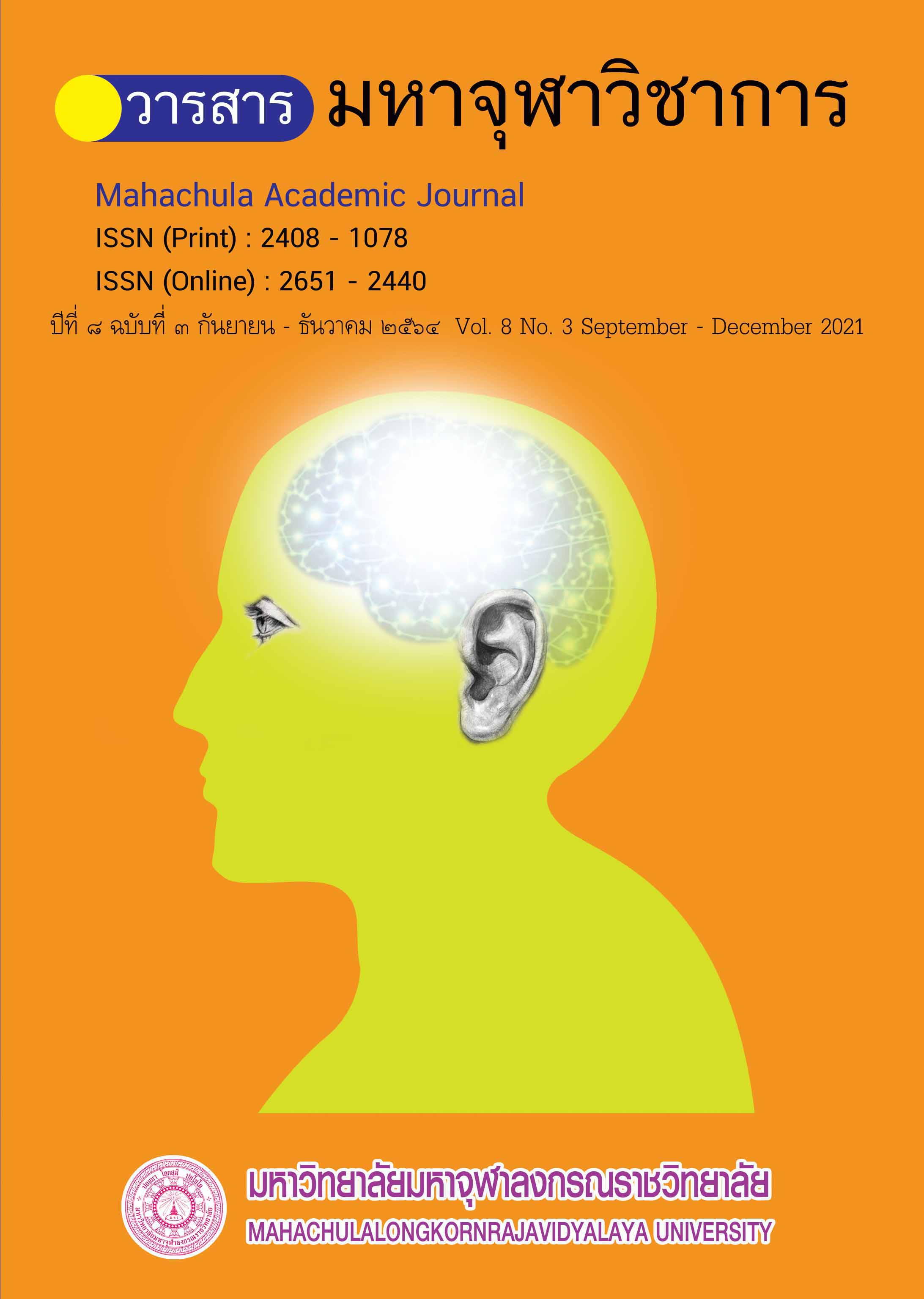Saving electricity in schools with the innovative E Plus system
Main Article Content
Abstract
This research article has the objectives to study electricity-saving analysis in schools with the innovative E Plus system. The sample group selected a specific type. Be administrators of 5 primary schools, totaling five schools. Research instrument Questionnaire on the study of building management model the use of electric energy-saving innovations among primary school personnel estimated five statistics used in the research: percentage, mean, standard deviation. The research results found that Electricity saving system E Plus is a cool air conditioner with energy-saving, controlled by inverter control. Using natural healing nature to reduce energy consumption helps ventilate Filters the air and freshen energy usage. Air conditioning with cool air saves energy. The research showed that the innovative E Plus system is a technology that combines the functions of a cool air generator. Water cooler Air conditioners, evaporative fans, electric energy-saving systems Energy saving, controlled by inverter control Using the principles of natural healing nature to reduce energy consumption Help ventilate. Air filters reduce energy consumption with energy-saving cold air. Ice machines and sterilizers in RCI technology use the UV light that hits the corner as Hydrogen peroxide and ozone to kill germs. It has reduced electricity efficiency, resulting in a significant savings of 60-70 percent of electricity consumption.
Article Details
References
กมลรัตน์ อายุวัฒน์. “ความรู้ความเข้าใจของผู้บริหารองค์การบริหารส่วนตำบลจังหวัดนครสวรรค์ ในการขอรับการสนับสนุนจากกองทุนคุ้มครองเด็ก”. สารนิพนธ์. สถาบันบัณฑิตพัฒนบริหารศาสตร์, ๒๕๕๓.
เกษม จันทรศร. “ปัจจัยทางจิตสังคมที่เกี่ยวข้องกับการต้านทานยาเสพติดของนักเรียนมัธยมศึกษาตอนต้น”. วิทยานิพนธ์ปริญญามหาบัณฑิต. สถาบันบัณฑิตพัฒนบริหารศาสตร์, ๒๕๔๑.
ไกรพันธ์ พูลพันธ์ชู สาธร ทรัพย์รวงทอง และนันทิยา น้อยจันทร์. “รูปแบบการบริหารงานวิชาการสถานศึกษาต้นแบบพัฒนาสู่ประชาคมอาเซียนของสถานศึกษาขั้นพื้นฐาน”. วารสารมหาจุฬาวิชาการ. ปีที่ ๗ ฉบับที่ ๓ (กันยายน-ธันวาคม ๒๕๖๓) : ๒๒๑-๒๒๓.
ฉันทนา รวงผึ้ง. “การสร้างความสุขอย่างยั่งยืนเชิงพุทธศาสนา”. วารสารมหาจุฬาวิชาการ. ปีที่ ๗ ฉบับที่ ๓ (กันยายน-ธันวาคม ๒๕๖๓) : ๑.
ดวงดาว ทัศนประเสริฐ กรวสา จันทวงศ์วิไล และลำใย มากเจริญ. พฤติกรรมการประหยัดพลังงานไฟฟ้าของนักศึกษาคณะบริหารธุรกิจ. กรุงเทพมหานคร: คณะบริหารธุรกิจ มหาวิทยาลัยเทคโนโลยีราชมงคลพระนคร, ๒๕๕๗.
ดวงเดือน พันธุมนาวิน. จริยธรรมในการทำงาน. กรุงเทพมหานคร: ไทยวัฒนาพานิช, ๒๕๓๘.
ดวงเดือน พันธุมนาวิน. จิตวิทยาจริยธรรมและจิตวิทยาภาษา. กรุงเทพมหานคร: ไทยวัฒนาพานิช, ๒๕๔๒.
นิภาพร โชติสุดเสน่ห์. “ปัจจัยทางจิตสังคมที่เกี่ยวข้องกับพฤติกรรมการท่องเที่ยวเชิงอนุรักษ์ของนักศึกษามหาวิทยาลัย”. รายงานผลงานวิจัย. สถาบันบัณฑิตพัฒนบริหารศาสตร์, ๒๕๔๕.
ราชบัณฑิตยสถาน. พจนานุกรมฉบับราชบัณฑิตยสถาน พ.ศ. ๒๕๔๒. กรุงเทพมหานคร: นานมีบุคส์พับลิเคชั่นส์, ๒๕๔๖.
ลินดา สุวรรณดี. “ปัจจัยทางจิตสังคมที่เกี่ยวข้องกับพฤติกรรมการลดปริมาณขยะของนักเรียนในโรงเรียนที่เข้าร่วมโครงการรุ่งอรุณ”. วิทยานิพนธ์ศิลปศาสตรมหาบัณฑิต. มหาวิทยาลัยขอนแก่น, ๒๕๔๓.
ศิริวรรณ เสรีรัตน์ และศุภร เสรีรัตน์. การวิจัยตลาด: ฉบับมาตรฐาน. กรุงเทพมหานคร: ธรรมสาร, ๒๕๔๒.
สถาบันนำราศนราดูร. คู่มือการปรับปรุงคุณภาพอากาศภายในอาคารสถานพยาบาล. นนทบุรี: สถาบันนำราศนราดูร, ๒๕๖๐.
สำนักวิจัยและส่งเสริมการเกษตร มหาวิทยาลัยแม่โจ้. แนวปฏิบัติสู่การเป็นสำนักงานสีเขียว (Green Office). เชียงใหม่: สำนักวิจัยและส่งเสริมการเกษตร มหาวิทยาลัยแม่โจ้, ๒๕๖๐.
สุปริญญา ลิ้มวนานนท์. “ปัจจัยที่ส่งผลต่อพฤติกรรมการประหยัดพลังงานไฟฟ้าในสถานที่ทำงานของพนักงานบริษัทห้างขายยาตราเสือดาว”. วิทยานิพนธ์ปริญญามหาบัณฑิต. มหาวิทยาลัยศิลปากร, ๒๕๕๙.
Jamlek K. Study of Factors Affecting Energy Conservation in an Electronics Company. Bangkok: Thammasat University, 2016.
Kittisarawanno S, Pimdee P. Factors Correlates of Electric Energy Saving Behavior of Student in Rajamangala University of Technology. Bangkok: Technology Phra Nakhon, 2007.
อำพน กิตติอำพน. “มาตรการลดใช้พลังงานภาครัฐ”. [ออนไลน์]. แหล่งที่มา: https://www2.soc.go.th/wp-content/uploads//slkupload/v55_88.pdf [๒๔ ธันวาคม ๒๕๖๓].
Emsa-ard P. “Thailand Energy Efficiency Development Plan 2015”. [Online]. Available: http://www.enconlab.com/unep/downloads/seminar290658/part1/02_GlobalWarming_prakorb.pdf. [7 January 2021].


